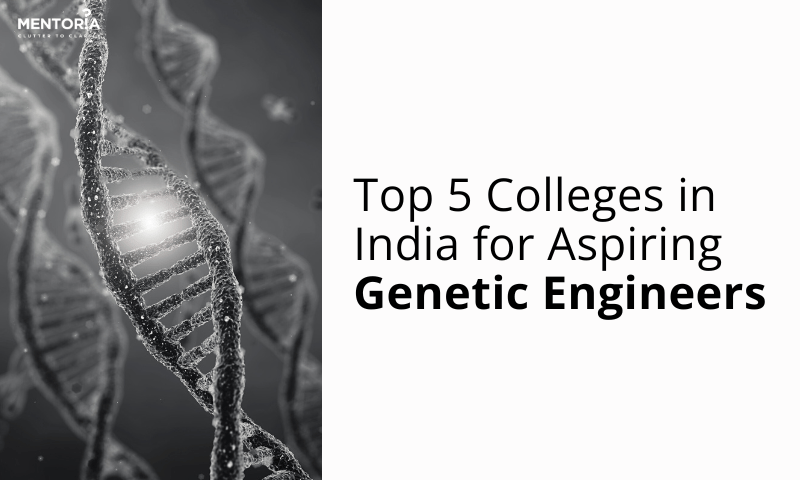Top 5 Colleges in India for Aspiring Genetic Engineers

Genetic engineers are the science equivalent of the Avengers, rescuing the day with sustainable food and miraculous treatments. But here’s the catch – if you want to be a part of this heroic squad, you must attend the correct institution. It’s like your personal training facility. In a slick curriculum, you’ll discover all the superpowers like molecular biology, genetics, and biochemistry. You’ll also get to put on your lab coat and experiment with genetic engineering tools while being supervised by industry experts.
Now, a few extra things can help you become in shape for your genetic engineering profession. Begin your research as soon as possible – it’s like acquiring your own Iron Man suit. You’ll become a research expert and stay up to date on the latest trends. Use every resource available at your campus, from the library to career counselling. It’s like having your own personal support team. Finally, establish friends with other professionals. Connect with other genetic engineering students and professors. You’ll learn from them, and who knows, you might even collaborate on some amazing projects.
Now, let’s talk about some of the cool things you can do with a degree in genetic engineering.
- Develop new medical treatments, such as gene therapy and gene editing.
- Create sustainable food sources, such as drought-resistant crops and crops with higher nutritional value.
- Improve the environment, such as by developing bacteria that can clean up pollution.
- Design new materials, such as bioplastics and self-healing materials.
- Explore the universe, such as by developing microbes that can survive in extreme environments.
Genetic engineering is a challenging but rewarding field. With hard work and dedication, you can achieve your goals and make a difference in the world.
An Overview of the Top 5 Genetic Engineering Colleges In India
Indian Institute of Science (IISc), Bangalore: IISc is one of India’s premier research institutions, offering a wide range of genetics and biotechnology programmes. It has a strong faculty and state-of-the-art research facilities. Common core courses such as principles of genetics, molecular biology, biochemistry, cell biology, microbiology, immunology, recombinant DNA technology, and bioinformatics are taught. Elective courses include human genetics, animal genetics, plant genetics, microbial genetics, cancer genetics, genomics, proteomics, and metabolomics. Additionally, students need to complete a research project or dissertation. The fees for these programmes vary, with the Indian Institute of Science (IISc), Bangalore charging around 10,000 – 15,000 rupees. Scholarships like the Indian Council of Medical Research (ICMR) Junior Research Fellowship (JRF) are available for students pursuing genetics and biotechnology studies in India.
IISc is one of the most prestigious and selective universities in India. It is also one of the most competitive universities for genetics and biotechnology programmes. However, the demand for graduates of IISc’s genetics and biotechnology programmes is very high. IISc graduates have gone on to successful careers in academia, industry, and government.
Indian Institute of Technology (IIT) Bombay: IIT Bombay is known for its Department of Biosciences and Bioengineering, which offers undergraduate and postgraduate programmes in biotechnology, genetic engineering, and related fields. TThe demand for engineers and scientists in India is high. The Indian government has invested heavily in education and infrastructure in recent years, and this has created many new opportunities for engineers and scientists. The course structure for the genetic engineering programme at IIT Bombay includes a comprehensive curriculum spanning three semesters. In the first semester, students study subjects such as Molecular Biology, Genetics, Biochemistry, Analytical Biochemistry, Microbiology, and Biophysics.
The second semester focuses on Genetic Engineering, Immunology, Genomics and Proteomics, Bioinformatics, Molecular Diagnostics, and Research Methodology and Scientific Communication Skills. In the third semester, students have the opportunity to choose elective courses and engage in Project Proposal Presentation and Dissertation Work. Additionally, there are specific scholarships available for genetic engineering students, including the DBT Junior Research Fellowship, ICMR Junior Research Fellowship, and CSIR Junior Research Fellowship, which support students pursuing a PhD in various fields of biotechnology, biomedical research, and science and technology.The fees for each programme vary, with undergraduate students paying INR 9,700 per semester, postgraduate students paying INR 12,500 per semester, and doctoral students paying INR 15,000 per semester.
University of Delhi: The University of Delhi, particularly its South Campus and North Campus, has several colleges with strong genetics and biotechnology programmes. Institutions like the Department of Genetics at the University of Delhi South Campus are well-known for their research in genetics.
The B.Sc. (Hons.) in Genetic Engineering at the University of Delhi offers a comprehensive course structure that covers various aspects of the field. In the first semester, students study subjects like Molecular Biology and Genetics, Inorganic Chemistry, Mechanics, Mathematics for Biologists, Communication Skills, and Basics of Computer programming. The second semester focuses on Cell Biology and Biochemistry, Organic Chemistry, Electromagnetism and Optics, Statistics for Biologists, Technical Writing, and programming with C++. The third and fourth semesters delve into subjects like Microbiology, Immunology, Molecular Genetics, Biostatistics, and various branches of Biotechnology. In the fifth and sixth semesters, students undertake a research project and choose elective subjects such as Genomics and Proteomics, Bioinformatics, Nanobiotechnology, Stem Cell Biology, Medical Biotechnology, and Ag Biotechnology. The fees for the course range from INR 5,000 to INR 10,000 per year.
Scholarships play a crucial role in supporting students pursuing Genetic Engineering at the University of Delhi. Among the scholarships available are the UGC Merit Scholarship, UGC Post Graduate Scholarship, CSIR-UGC NET Fellowship, DBT-JRF Fellowship, INSPIRE Fellowship, and ICMR-JRF Fellowship. These scholarships provide financial assistance to deserving students, enabling them to focus on their studies without the burden of excessive financial obligations. Moreover, the demand for Genetic Engineering graduates is rapidly increasing in India. Graduates can explore employment opportunities in various sectors, including biotechnology, pharmaceuticals, agriculture, food processing, research institutes, hospitals, clinics, and government agencies. This growing demand ensures promising career prospects for Genetic Engineering graduates.
National Institute of Biotechnology (NIBMG), Kalyani: NIBMG is an autonomous institute dedicated to genomic research and genetic medicine. It offers various training programmes and courses related to genetics and genomics.
The Integrated M.Sc. in Biotechnology programme at NIBMG, Kalyani is a comprehensive five-year course designed to provide students with a strong foundation in biotechnology. The programme covers a wide range of subjects, including mathematics, physics, chemistry, and biology in the first year. In the second year, students delve deeper into core biotechnology courses, such as molecular biology, genetics, and biochemistry. The third year focuses on applied courses, including recombinant DNA technology, immunology, and bioinformatics. In the fourth year, students undertake a research project in their chosen field of biotechnology, followed by a dissertation in the fifth year. The tuition fee for each semester is ₹10,000, with an additional ₹5,000 for other fees.
In addition to scholarships, there are numerous job opportunities for students pursuing the Integrated M.Sc. in Biotechnology programme at NIBMG, Kalyani. The field of genetic engineering offers a promising future, with a high demand for skilled professionals. Pharmaceutical companies rely on genetic engineers to develop innovative drugs and vaccines, as well as enhance the manufacturing process. In agriculture, genetic engineers play a crucial role in creating genetically modified crops that are more resilient to pests and diseases, and possess higher nutritional content. With the potential for groundbreaking discoveries and advancements, the scope for genetic engineering is vast and offers a rewarding career path.
Tata Institute of Fundamental Research (TIFR), Mumbai: TIFR is a premier research institution in India, and its Department of Biological Sciences is renowned for its work in genetics and molecular biology. The Genetic Engineering course at TIFR is a comprehensive programme that spans over 5 years, leading to an integrated Ph.D. degree. The initial two years are dedicated to coursework, which encompasses a broad range of subjects in genetics such as molecular biology, cell biology, biochemistry, microbiology, immunology, and bioinformatics. These courses provide a strong foundation for students to delve into the field of genetic engineering. Apart from the coursework, students also engage in research rotations across various laboratories at TIFR. This allows them to gain exposure to diverse areas of genetic engineering research and aids in the selection of a suitable research mentor for their Ph.D. dissertation.
In terms of fees, Indian students are required to pay approximately ₹10,000 per year, while international students have to pay ₹100,000 per year. However, TIFR offers several scholarships to support students in their Ph.D. journey. These scholarships are awarded based on both merit and financial need. Notable scholarships available for students in the Genetic Engineering programme include the Tata Institute of Fundamental Research Fellowship, Council of Scientific and Industrial Research (CSIR) Junior Research Fellowship, University Grants Commission (UGC) Junior Research Fellowship, and Department of Biotechnology (DBT) Junior Research Fellowship. These scholarships provide financial assistance and recognition to deserving students.
Graduates of the Genetic Engineering programme at TIFR have a wide range of career opportunities in academia, industry, and beyond. As the field of genetic engineering continues to advance, there is a high demand for skilled professionals. Graduates can choose to become research scientists in academia or industry, where they contribute to cutting-edge research in areas like gene editing, gene therapy, and genetic analysis. They can also pursue roles as development scientists in the biotechnology industry, where they work on creating genetically modified organisms and innovative biotechnological products.
A Few Pointers for Thriving in Genetic Engineering Classes
Participate in research: A job in genetic engineering requires research experience. Discuss research opportunities in their labs with your lecturers. Applying for summer internships at research institutions is another option.
Benefit from your resources: Numerous resources are available in genetic engineering programmes to aid students in their success. Utilise the campus’s library, tutoring services, and other amenities.
Develop a relationship with your lecturers: because they are there to support your success. Get to know them and enquire about them. They can also provide you with insightful career guidance.
Join a student networking group: Joining a student networking group is a fantastic method to learn and develop. Participate in student events and join clubs for students
In the fascinating field of genetic engineering, there has been a phenomenal uptick in discoveries and innovations during the past few decades. The possibilities, from deciphering the human genome to the development of CRISPR-Cas9 technology, are endless. In order to solve pressing problems like eliminating genetic disorders, improving crop yields to feed an expanding population, and even reducing climate change through bioengineering techniques, genetic engineering holds enormous promise.
It does have two edges, though. Nature manipulation raises ethical questions and poses the risk of unforeseen repercussions. The secret is to strike a balance between scientific innovation and ethical application. To guarantee the moral and secure application of genetic engineering, regulation and control are essential.
Collaboration and communication between scientists, ethicists, decision-makers, and the general public are crucial as the discipline continues to develop. Collectively, society must decide how to proceed, taking into account both the tremendous advantages and potential threats. In order to ensure that science and ethics coexist in a way that benefits both people and the environment, the future of genetic engineering will depend on our ability to harness its potential for good.
How Mentoria Can Help Choose
Choosing a career is one of the most important decisions you will make in your life. It will have a significant impact on your financial security, happiness, and overall well-being. Mentoria’s psychometric assessment and career counselling services can help students to identify strengths, interests, and values, and to develop a career plan. We can also help you to learn more about the career, develop the skills and qualifications that are required, and find mentors and other resources to help you achieve your goals.









